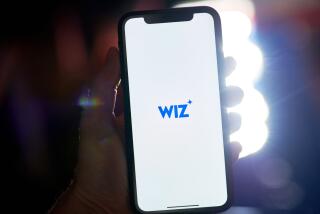Microsoft expansion may be a lesser evil
- Share via
WASHINGTON — After their long-running antitrust battles with Microsoft Corp., the last thing U.S. and European regulators want is for the software giant to get even bigger.
But as Google Inc. extends its dominance over the Internet, regulators are likely to view a more powerful Microsoft as the lesser of two evils and greenlight the proposed Yahoo deal, analysts said Friday.
“The simple notion is competition is good for consumers,” said Robert Hahn, executive director of the Center for Regulatory and Market Studies at the American Enterprise Institute, a Washington think tank. “Google may have a real rival now in online search and be subject to more competitive pressures in advertising. Regulators would take that into account.”
That’s not to say the proposed $44.6-billion takeover would be a slam-dunk. The U.S. Justice Department said Friday that it would review Microsoft’s proposed acquisition, if accepted by Sunnyvale, Calif.-based Yahoo Inc., foreshadowing the intense scrutiny such a deal would face because of its size and Microsoft’s history.
European regulators, who have been tougher on Microsoft in recent years, also would have to approve the deal.
In the U.S., the potential combination of two of the technology industry’s biggest names already is drawing congressional attention. A House antitrust task force will examine the deal next week and Sen. Herb Kohl (D-Wis.), chairman of the Senate’s antitrust subcommittee, promised Friday to hold hearings, saying he wanted to make sure the deal wouldn’t harm competition or erode Internet users’ privacy.
Lawmakers and regulators review major deals to determine if they will make companies too powerful by eliminating rivals that help keep prices down by competing for customers.
The loss of Yahoo, one of three major online search and advertising players, could potentially allow Google and Microsoft to dominate the market, leading to higher prices.
Microsoft said it expected the proposed Yahoo takeover to receive regulatory approval in the second half of the year. The Redmond, Wash.-based company’s pitch to regulators would emphasize the benefits of a stronger counterbalance to Google, said Brad Smith, Microsoft’s general counsel.
“I think the reaction of most people already is and will be that this kind of combination makes this market much healthier and much more competitive because it offers the prospect of creating a much more compelling alternative to the existing super-dominant company in the marketplace,” he said. “Within an hour of sending out the press release [announcing the proposed deal], we were hearing from other companies saying, ‘You’ve made my day. Bravo.’ ”
Smith and other Microsoft lawyers will be able to dispense with the introductions when sitting down with U.S. and European regulators. They know each other well from battles dating to the 1990s -- and that poses obstacles for the Yahoo deal, antitrust experts said.
A U.S. district judge this week extended court oversight of Microsoft until November 2009. Judge Colleen Kollar-Kotelly has been monitoring Microsoft’s compliance since the 2002 settlement of a landmark antitrust case against the company for abusing its dominance in the computer operating software market.
The European Union last month announced two new investigations of Microsoft related to whether it used its dominance in word-processing and spreadsheet programs to squelch rivals and illegally tied its Internet browser to its Windows operating system. The probes followed Microsoft’s decision last fall to overhaul its business practices and pay a $739-million fine, ending a nine-year fight with European officials over antitrust issues.
“Microsoft is a very, very dominant player, and any time it goes into a neighboring market it’s going to raise all sorts of questions,” said Dennis Oswell, a European Union antitrust lawyer.
But Microsoft is a much smaller player in Google’s neighborhood. And although antitrust regulators traditionally are hesitant to allow a market to shrink from three main competitors to two, Mountain View, Calif.-based Google is such a mighty No. 1 in online search and advertising that the arithmetic changes.
“Is it the number of players or is it the economic effects that you should look to?” said Edward P. Henneberry, co-chair of the European Practice Group of law firm Heller Ehrman. “Any time you have some increased competition against a dominant player, I think both sides of the ocean are going to take note of that.”
The calculation could resonate in Washington, where regulators last year approved Google’s purchase of leading online advertising company DoubleClick Inc.
Microsoft lobbied hard against that deal, complaining that it would increase Google’s dominance over the Internet ad market. But though it lost that fight, Smith believes Microsoft laid the groundwork for getting a potential Yahoo deal approved.
“It has definitely created an appreciation of what this market is like, how the technology works and frankly what a large market share Google has,” he said. “People in government would say, ‘Why don’t you get together with Yahoo as a better way to assure competition?’ ”
But the data-collection power of a combined Microsoft and Yahoo, while still much smaller than Google’s, is something federal regulators and Congress should also consider, said Jeff Chester, executive director of the Center for Digital Democracy.
“This merger poses new privacy threats to consumers everywhere,” he said.
Chester strongly opposed Google’s purchase of New York-based DoubleClick, which is being held up while European regulators study it. But given the deal’s U.S. approval, Chester acknowledged that the only way to rein in Google might be to allow Microsoft to grow.
“Sadly, the public may be left with no choice but to see if a Microsoft-Yahoo combination can provide some competition to Google,” he said.







